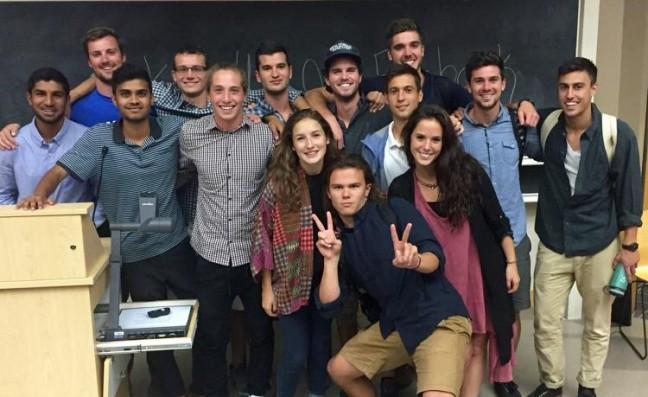While sexual assault awareness on college campuses may be increasing, one group of University of Wisconsin students decided it wasn’t enough — too many men were missing from the conversation.
“We’re Better Than That: Men Against Sexual Assault,” was founded by 14 UW male students in August in an effort to address an issue prevalent on university campuses throughout the nation. After its first meeting, membership grew from 14 to 75 members.
Inspired from Jackson Katz’s book “The Macho Paradox: Why Some Men Hurt Women and How All Men Can Help,” the group took initiative to make their perspective become reality.
Co-founder and senior Hasan Nadeem said they got the initiative to found this group after realizing the absence of organizations that provide a platform for men to address sexual assault.
“A lot of these [other] organizations focus on empowering women, but we couldn’t even think of one where the whole focus is on men,” Nadeem said.
While not all perpetrators of sexual assault are men and not all victims are women, the group finds it important to tackle the issue of male-on-female crime: sexual assault’s most rampant form. Their focus thus far has embraced a male dialogue — something they feel has been missing from the movement.
Janet Hyde, a UW professor of gender and women’s studies, said a focus on the role of men is vital in combatting sexual assault.
“The thing that’s [going to] end sexual assault is not women being more careful, but men stopping assaulting,” Hyde said. “They’re targeting men students, and I think that’s a fabulous idea.”
While reducing or even eliminating sexual assault is a tall order, Nadeem thinks it’s important to focus on its origins.
“In the reading I’ve done, a lot of [sexual assault] comes from entitlement to or disregard for someone else for one reason or another.”
The first step toward progress, Nadeem said, is to begin changing the way society views gender.
“If you don’t believe these random, made-up markers signify one thing or another, then you’re not going to have a reason to sexually assault someone else,” he said.
Beside taking a fresh look at gender, Hyde said education about more commonplace factors, such as alcohol, play a crucial role in preventing assault.
Joe Naughton, another co-founder and senior, said the organization’s efforts toward change also target ending the use of what they see as problematic terms and phrases.
“We do not like the term ‘rape culture,’” Naughton said. “As the young men of [We’re Better Than That] have observed, the use of this phrase only perpetuates the vicious cycle of victim focus.”
Nadeem said terms like ‘rape culture’ and ‘gender violence’ deem women as victims immediately, but the focus should be on what motivates the man to commit an assault.
The word “rape” possesses harsh imagery that can evoke an uncomfortable pathos for men, Nadeem said. While We’re Better Than That recognizes the existence of rape culture as a real and scary thing, he said they want to avoid using this terminology out of fear of driving away the male demographic.
But not everyone working to prevent sexual assault believes these terms are problematic.
“I think it’s validating the people that have suffered violence because of the culture that allows for rape to happen,” said Sophie Nielsen, chair of UW’s chapter of Promoting Awareness Victim Empowerment.
Still, Nielsen introduces a new term, “consent culture,” which affirms the idea stressing the importance of “yes means yes” as opposed to “no means no.” She said this new term might help prompt conversation while straying from the negative imagery surrounding the term “rape culture.”
Since multiple large organizations already exist to bolster sexual assault awareness, We’re Better Than That prides itself with its focus on action, Nadeem said.
But, Nielsen said awareness still needs to consistently remain a part of the conversation, even for an action-based group.
“I think as long as people are still being assaulted, there needs to be more awareness,” she said. “Action implies awareness.”
For their first project, We’re Better Than That has teamed up with Wisconsin Athletics to create a video call to action and will work with athletes to help promote their message, Naughton said.


